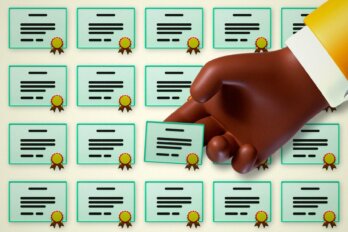I received some great advice as a graduate teaching assistant: Don’t reuse material, or at least don’t reuse it within four years. Teach the same texts, sure, but change the assignments. I’ve done this religiously for thirty-six years now. In fact, for the past sixteen years, I haven’t even assigned topics; I’ve asked students to come up with their own. But even that hasn’t prevented plagiarism entirely.
In 1993, I taught two students from the same fraternity in different sections of a first-year writing course. One of them wrote and submitted a paper; a week or so later, the other submitted the exact same paper. Was it laziness? Panic? Misplaced sympathy? Immaturity? I called them both in, talked with them, and had them write about the incident. Obviously, I didn’t allow them to use the plagiarized assignment in their final portfolios, though I let them use the papers about the incident (which one of them did). I reduced their final marks a full letter grade, but I didn’t report the incident to judicial affairs (I did, however, confer with my vice-chair). What I didn’t expect? How all of this would stress me out and exhaust me.
A couple of weeks later, the student who had actually written the paper came to see me. He was absolutely distraught: He was a first-generation student and felt he had failed his family. He broke down, convinced he’d never make it through his degree. I spent well over an hour giving him a pep talk—all of us make mistakes, this wasn’t irretrievable—and sent him off. From then on, he was a model student. We stayed in touch for the rest of his university career. I even attended his wedding. So what could have been one of the nastier experiences of his life turned into something positive and productive. (Ultimately, it was positive and productive for me, too. I wrote a conference paper about the situation—a feminist approach to dealing with plagiarism.)
I once had a student turn in a final paper that he copied completely from the web. The clue: he used a variant spelling of Thomas Malory’s surname. I mentioned this to another professor, who was in complete disbelief. She said the student had turned in a brilliant final paper in her class, and I suggested she Google a phrase or two. Turns out, he had plagiarized that paper as well. He was supposedly a bright light in that year’s incoming class, but he wasn’t bright enough to use a word processor’s find-and-replace function. He didn’t end up graduating.
Most cheating is pretty cut and dried, but two years ago I was involved in a case that wasn’t all that clear. An honours student was an undergraduate TA for a communications class. The students in her section had higher grades than the students in other sections, so the instructor accused her of circulating the test questions in advance. She maintained that she didn’t pass out the questions, and I believed her. Things deteriorated quickly. The instructor referred her to judicial affairs; her parents called in a lawyer.
It seemed obvious to me that the material had been circulating for several years. When I Googled the textbook’s title, the instructor manual popped up—with all of the test questions. I raised this point with judicial affairs, and discovered the instructor had absolutely no idea that the stuff was on the Internet. In the end, the TA had to take an online ethics course that cost $100 and took eight hours to complete. I encouraged her not to fight the punishment, though we both felt it was an unsatisfactory resolution.
Plagiarism is a fuzzy thing. Do we need to document that John A. Macdonald was the first prime minister of Canada? That water boils at 100 degrees? That it’s made up of two parts hydrogen, one part oxygen? That pi equals 3.1416? Probably not. Do we need to document that Jane Austen wrote Pride and Prejudice? That Shakespeare wrote sonnets? That Charlotte Brontë wrote Jane Eyre? Even colleagues can disagree on what “proper citation” means. I know one professor who maintains that anything easily accessible online doesn’t need to be cited. I disagree: I believe anything beyond “general knowledge” needs a proper citation. But what counts as general knowledge? It means one thing in one context but something completely different in another. How do we know what it is and when?
And do I penalize first-year students for not knowing what I expect them to know coming out of high school? Some of them arrive knowing MLA style fairly well, while others have never heard of it—never mind APA or Chicago. Do I take time in class to teach formatting? Is it right to waste the time of some students? Or do I hold optional tutorials, when I already have tons of administrative stuff to do? Do I tell students they’re in university now, and they can find resources in the library and online?
Plagiarism and cheating have evolved to new levels because of the Internet. I’m sure I’ve missed some cheating—as I’m sure most professors do. With all the pressure to “publish or perish,” and with electronic access to journals and texts, it’s nigh on impossible to keep up with the scholarship, do your own work (administrative, advising, committee, writing), and still be certain you’re reading students’ work thoroughly and giving good feedback. It’s become more of a challenge in the last twenty years, and the increased reliance on lecturers and sessional instructors (many of whom are absolutely excellent) hasn’t helped. They are often teaching at night or as a second job, hoping to break into academia, and simply don’t have the time that tenured faculty members have to pursue all suspicious activity.
Now for my favorite anecdote: A few years back, a professor had a discussion with his class, and maintained that you could write something well, grammatically speaking, and say absolutely nothing. The class didn’t believe him, so he did it. Two years later, he got his own essay back. It had apparently found its way into a fraternity file. So the professor called the student in and told him he could flunk him for one of two reasons: because the paper said nothing, or because he’d plagiarized. That’s a lighter side, if there is one, of this whole issue.






